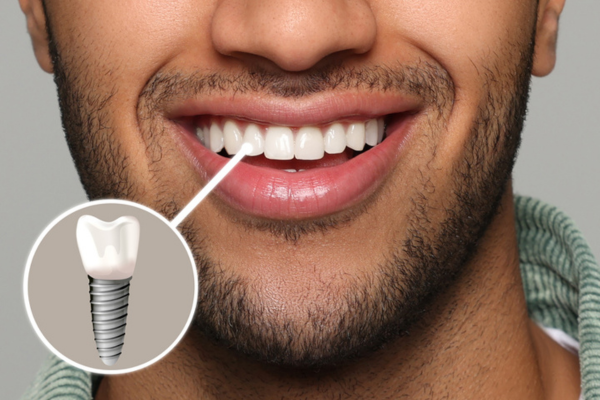Oral Care Post Implant Placement: Your Guide to Healing and Maintenance
Dental implants are one of the most effective and long-lasting solutions for replacing missing teeth. They restore both the appearance and function of natural teeth and can significantly improve quality of life. However, the success of a dental implant largely depends on how well you care for it—especially in the days, weeks, and months following placement.
In this blog, we’ll guide you through what to expect after implant surgery and how to care for your mouth to ensure smooth healing and long-term success.
What Happens After Implant Surgery?
After implant placement, your body begins the healing process where the titanium post (implant) integrates with your jawbone—a process called osseointegration. This can take several weeks to a few months. During this period, it’s crucial to protect the surgical site, avoid infection, and support healing through proper oral care.
The First 24–48 Hours: Initial Recovery
- Manage Bleeding and Swelling: It’s normal to experience some bleeding, swelling, or bruising after the surgery. Your dentist or oral surgeon will give you gauze pads to bite down on. Keep gentle pressure on the gauze for about 30–60 minutes, replacing it as needed.
- Apply a cold compress to the outside of your face in 15-minute intervals.
- Keep your head elevated, even while sleeping.
- Avoid strenuous activity for at least 48 hours.
- Stick to Soft Foods: Choose soft, cool, and non-acidic foods for the first day or two:
- Yogurt
- Mashed potatoes
- Scrambled eggs
- Smoothies (without a straw)
Avoid hot, spicy, hard, or crunchy foods that may irritate the site or dislodge the clot.
- Avoid Disturbing the Site:
- Do not touch the implant area with your fingers or tongue.
- Do not spit, rinse vigorously, or use a straw, as this can dislodge the blood clot and delay healing.
- Avoid smoking and alcohol for at least 72 hours.
Oral Hygiene During Healing
- Brushing:
- Continue brushing your other teeth as normal.
- Use a soft-bristled toothbrush and avoid the surgical area for the first few days.
- After 2–3 days, you may gently brush near the implant using a toothbrush recommended by your dentist.
- Rinsing:
- Avoid mouthwash containing alcohol for the first week.
- After 24 hours, gently rinse with warm salt water (1/2 tsp salt in a glass of warm water) 3–4 times a day, especially after meals.
Diet Tips for the First Week
- As your mouth heals, you can gradually reintroduce a more regular diet, but still avoid:
- Crunchy foods like chips and nuts
- Sticky foods like candy or gum
- Hot beverages like coffee or tea (at least for the first 48 hours)
- Drink plenty of fluids (without a straw) and maintain good nutrition to aid healing.
What to Watch Out For
While mild discomfort, swelling, or bruising is common, contact your dentist immediately if you notice:
- Persistent or severe pain
- Excessive bleeding that doesn’t stop with pressure
- Signs of infection: pus, swelling, fever, or foul odor
- The implant feels loose or moves
Early detection and management of complications are crucial for implant success.
Long-Term Oral Care for Implants
Once the implant has fully healed and your dentist places the crown (artificial tooth), maintaining oral hygiene becomes even more important.
- Daily Routine:
- Brush twice a day with a soft-bristled toothbrush and non-abrasive toothpaste.
- Floss daily using implant-safe floss or tools like a water flosser or interdental brushes.
- Use an antibacterial mouth rinse if advised by your dentist.
- Professional Cleanings:
- Visit your dentist every six months (or as recommended) for professional cleanings and checkups.
- Your dentist will check the health of the implant, surrounding gums, and supporting bone.
Lifestyle Tips to Support Implant Longevity
- Quit smoking: Smoking slows healing and increases the risk of implant failure.
- Avoid grinding your teeth: If you grind at night, consider wearing a nightguard.
- Maintain a healthy diet: Calcium and vitamin D are essential for bone health.
- Treat gum disease promptly: Inflammation around the implant (peri-implantitis) can lead to bone loss.
Final Thoughts
A dental implant is a long-term investment in your oral health, and with the right care, it can last for decades. Following your dentist’s post-op instructions, maintaining good hygiene, and staying consistent with your dental visits are key to a successful recovery and long-lasting results.
Whether you’ve just had an implant placed or are planning to get one, taking care of your mouth during the healing phase is the most important step toward a confident, healthy smile.
Support Your Implant with Proper Aftercare
With the right daily habits and regular checkups, your implant can stay strong and healthy for life.







